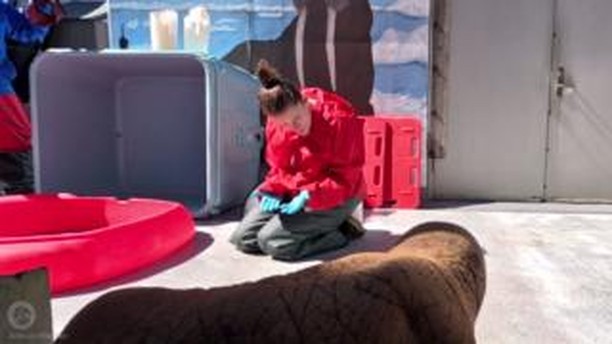- Introduction to Little Miss Walrus and Her Significance
- Importance of Aquatic Behavior in Walrus Calves
- The Role of Zoos in Wildlife Conservation
- Specialized Care and Rehabilitation Techniques for Rescued Walruses
- The Journey Toward Reintroduction into Natural Habitats
Little Miss Walrus, a beloved addition to the community, recently achieved a significant milestone: her first interaction with the "crab pool" at her facility. This key event underscores not only the development of this young walrus but also the intricate processes involved in her care and rehabilitation.
Walrus calves, like Little Miss Walrus, are typically very dependent on their aquatic environment for both play and survival skills. These animals exhibit a range of behaviors crucial for their development, and water play is central to this. When Little Miss Walrus took her first head dunk into the "crab pool," it marked her initial steps towards more profound aquatic adaptability. This behavior is crucial for young walruses as it builds their confidence and physical proficiency in navigating water.
Aquatic behaviors in walrus calves include activities such as head dunks, playful plunges, and, eventually, skilled swimming. Not only do these actions stimulate their physical development, but they also play a key role in their socialization. In the wild, walruses rely on such behaviors to establish group dynamics. Since they are highly social animals, their initial experiences in the water help them learn to interact with their peers and their environment.
Zoo management teams play a pivotal role in fostering these behaviors from a young age. Facilities like the one housing Little Miss Walrus are carefully designed to mimic the natural habitats of these animals. By providing features like the "crab pool," the specialists ensure that these environments are as enriching and stimulating as possible. This dedicated effort helps the young walrus engage in natural behaviors that would be crucial for her survival in the wild.
Emphasizing environmental enrichment is fundamental in zoo management, especially for species with complex social and behavioral needs like the walrus. Enrichment activities can include everything from sensory stimuli, like varying textures and smells, to problem-solving tasks designed to encourage natural foraging behaviors. Such activities not only prevent boredom but also enhance the animals’ physical and mental health, preparing them for possible future reintroduction into their native habitats.
The rehabilitation of a rescued walrus requires a multi-faceted approach. From specialized nutrition plans to tailored veterinary care, every aspect of their well-being must be thoroughly addressed. Initially, Little Miss Walrus was monitored closely for any signs of distress or health issues. The veterinary team would have conducted frequent health checks, focusing on her diet, skin condition, and overall physical development. Proper nutrition is paramount, particularly for calves, as they require a balanced diet rich in fats and proteins to ensure optimal growth and energy levels.
Moreover, social interactions are a key element of a young walrus’s development. In addition to human caretakers, other walruses provide essential companionship and social learning opportunities. These interactions help the calf understand group dynamics and establish social hierarchies, skills that are indispensable in the wild. Little Miss Walrus’s caretakers thus facilitated both human and walrus social interactions to foster a well-rounded upbringing.
Wildlife conservation is another crucial aspect of this journey. Zoos and aquariums globally collaborate on breeding programs aimed at preserving species at risk of extinction. These programs involve meticulous record-keeping and genetic matching to avoid inbreeding and to ensure the genetic diversity of the population. Little Miss Walrus represents not just an individual success story but a step towards the long-term conservation of walruses. Breeding programs, educational outreach, and public engagement are integral components of these efforts.
Additionally, these facilities often participate in rescue and rehabilitation efforts, wherein they take in animals that have been stranded or orphaned and provide critical care. The goal is ultimately to reintroduce these animals into their natural habitats where suitable. However, this process comes with its challenges, as reintroduction requires that the animal be fully capable of surviving independently, which includes finding food, avoiding predators, and successfully navigating the social structure of wild populations.
As Little Miss Walrus progresses, her milestones are carefully documented and analyzed. Each behavioral marker, from her first head dunk to her subsequent swims, provides data that contributes to a broader understanding of walrus behavior and needs. This data is vital for both improving current care strategies and informing future conservation actions. It helps scientists refine rehabilitation techniques and track the long-term success of reintroduction efforts.
In summary, Little Miss Walrus’s journey from her initial interaction with the "crab pool" to potential reintroduction encapsulates the broader efforts of zoos and conservationists in safeguarding wildlife. Every step—from understanding the importance of aquatic behaviors in walrus calves to the detailed care provided by zoo management—is integral to her well-being and future. These efforts not only ensure her individual development but also contribute to the greater goal of walrus conservation. Through dedicated care, ongoing research, and collaborative conservation programs, the hope is to secure a sustainable future for species like the walrus, preserving the delicate balance of our planet’s ecosystems.
*****
Source Description
❗️Walrus patient update❗️
Little miss walrus took her first dip in the “crab pool!”
Well… more like first head dunk, but still an important moment for this walrus calf ❤


